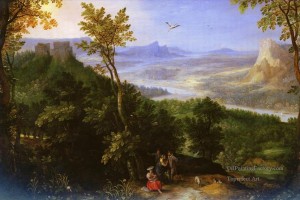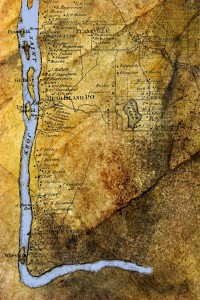I have spent the last few months—when I can spare a moment from teaching and marking—working on my novel about the now extinct village of Planeville. In some ways this project has been more difficult than others, perhaps because although I sometimes write stories using magic realist techniques, I haven’t used them to write a sustained project. My novels are nearly either strictly realist—like my science fiction novels which are basically thought experiments in the possibilities of our technology—or various forms of travel narratives. With this latest novel I am tasked with trying to evoke an almost forgotten feeling from childhood, and that is much more difficult.
I was young when I first heard vague stories about Planeville. Perhaps they were even more mysterious because of my age, but I listened with a confused fascination as I was told of the village that had been swallowed by forest. The flattened stories were told in as matter-of-fact a fashion as a list of chores, although that didn’t dull the image of a white spruce growing up through the blank pit that had been a basement and the plow stranded amongst the trees, its wooden parts rotted but the metal still waiting for a horse.
These glimpses into a life which no longer existed were endlessly evocative to me. My imagination supplied whatever elements the stories were too meagre to contain. I could see the deep moss on the ground, picture the knobby beech of the highland slopes,  and far away the forlorn bell of a lost cow. I imagined farm equipment tangled in fragrant roots and ferns and earthen cups which lay where they had been dropped. Planeville was my Pompeii, although the convenient narrative device of Vesuvius was missing. Part of that fascination had to do with my lack of understanding of the circumstances which caused the settlers to abandon their village. Many people around the world, Chinese farmers in the dust belt, Indian villagers along the coast leaving in droves for Mumbai, dustbowl farmers in Kansas in the depression, could have informed me, but in the pre-internet days of my youth, my curiosity was left to my untutored use of a poorly-stocked library.
and far away the forlorn bell of a lost cow. I imagined farm equipment tangled in fragrant roots and ferns and earthen cups which lay where they had been dropped. Planeville was my Pompeii, although the convenient narrative device of Vesuvius was missing. Part of that fascination had to do with my lack of understanding of the circumstances which caused the settlers to abandon their village. Many people around the world, Chinese farmers in the dust belt, Indian villagers along the coast leaving in droves for Mumbai, dustbowl farmers in Kansas in the depression, could have informed me, but in the pre-internet days of my youth, my curiosity was left to my untutored use of a poorly-stocked library.
I heard in the stories a mystery as to why the village had been abandoned, and I imagined the feelings of the last people as they loaded their wagons and trudged down the hill toward the river. I saw houses in the clearings gradually overrun by weeds and trees, and then the buildings sag and eventually fall into the cellars that had been laboriously dug when the hopeful villagers had first arrived.
When I began to tell the story of the founding and eventual abandonment of Planeville, I first went to the New Brunswick Archives, where I was definitively told that a village by that name never existed. All I had to argue on my behalf was my childhood glimpse of a map, which like a treasure map from  a pirate movie, was tattered and faded. I have a visual memory, however, so I could call up the vague image and examine it more closely, as well as the book it was in. Therefore, when I was stymied by the confident staff person I thought a moment and then ask for the shelf where the land atlases were kept. I guessed at the date on the cover of the book, for my memory didn’t supply that, but since I knew the back roads near where I had grown up I was able to trace the village to its source.
a pirate movie, was tattered and faded. I have a visual memory, however, so I could call up the vague image and examine it more closely, as well as the book it was in. Therefore, when I was stymied by the confident staff person I thought a moment and then ask for the shelf where the land atlases were kept. I guessed at the date on the cover of the book, for my memory didn’t supply that, but since I knew the back roads near where I had grown up I was able to trace the village to its source.
Unable to resist pointing out the evidence to the hovering staff person, I photocopied the map and my nephew and I tried to find it by running a compass line and pacing off the distances. Although we likely found the slope where the village had been, we didn’t find the long sunken houses and no signs of machinery. We lamented that we were at least fifty years too late, for the stories I had heard when I was young dated from a previous era.
Undaunted by the paucity of evidence, and statements to the contrary, I decided to tell the story of the people who have been entirely effaced from both folk history and local memory, as well as the official certification of maps and deeds. The archivist’s insistence on their lack of existence was a clue, I finally realized, and I assiduously set about re-examining what makes a people settle in a particular area, how they would come to build their houses deep in the forest, and more importantly, to me at least, why they would leave.
In an attempt to recover what time has forgotten, as well as evoke the magic of a child’s perception of story, I use the rich language of metaphor. In their dialogue, my characters speak in homely—in nineteenth century terms—rhythms and an almost animist understanding of the landforms by which they are surrounded. Their world is one of magic, whether that lies in their simple evocation of an untutored notion of the bible, or in folk notions that surrounded the hills even while I was growing up there. The peculiar behavior of other people, the forerunners and second sight some have laid claim to, as well as the mystery that lies in their misinterpretation of simple biological or astronomical functions—like those who are still entranced by fairy rings or the glowing and changeable heavens—all supply me with the rich fodder that is Planeville.
In this return to Planeville, I tell the story of those villagers by examining what drove some of the river valley people to abandon the rich bankside mud in order to wrest a living from the acid soil of the ridgeland. I am drawn to their hopes and accomplishments, their struggles and eventual despair, before they tired of the enterprise and disappeared from a history which has paid them scant regard.
